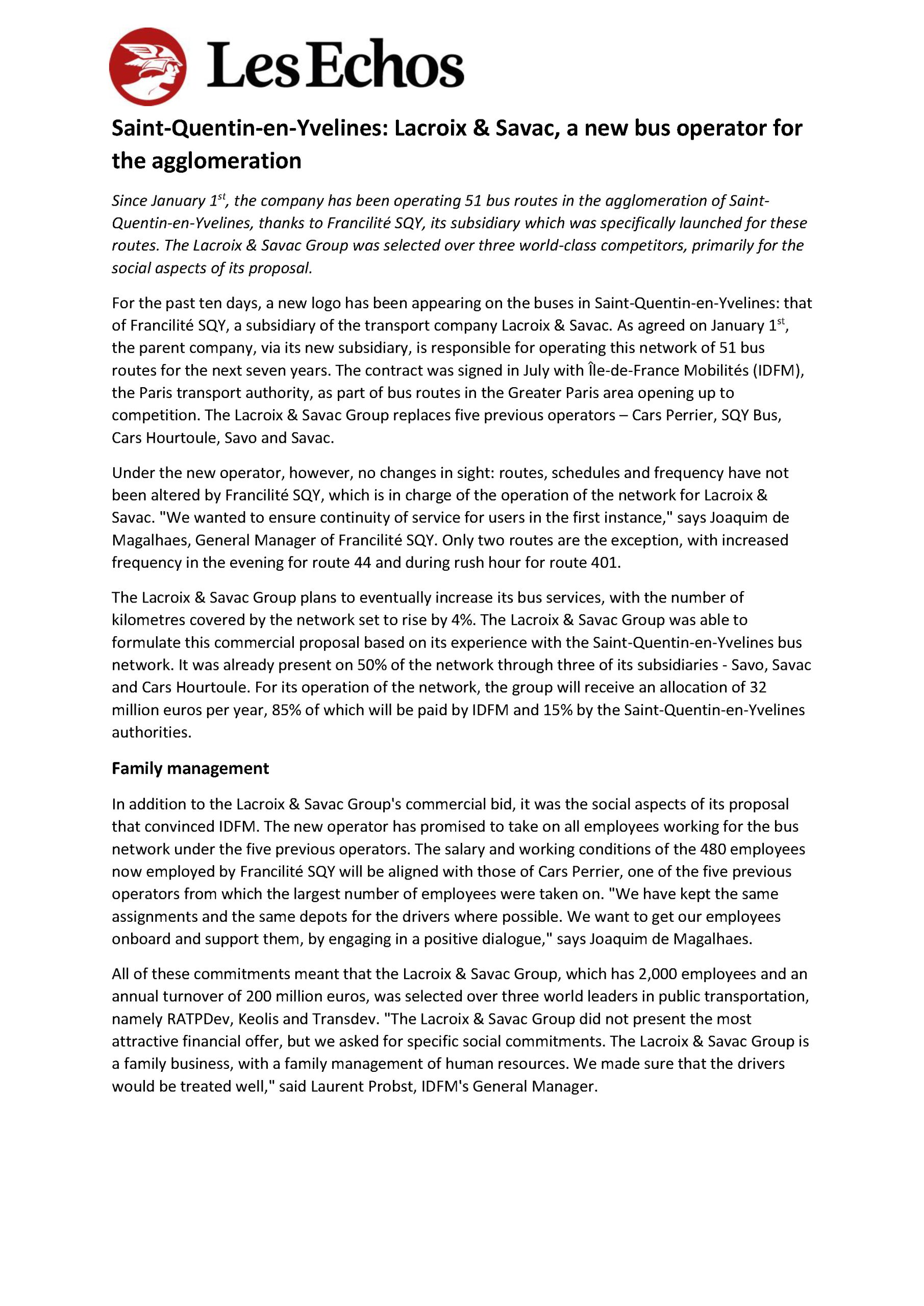Since January 1st, the company has been operating 51 bus routes in the agglomeration of Saint- Quentin-en-Yvelines, thanks to Francilité SQY, its subsidiary which was specifically launched for these routes. The Lacroix & Savac Group was selected over three world-class competitors, primarily for the social aspects of its proposal.
For the past ten days, a new logo has been appearing on the buses in Saint-Quentin-en-Yvelines: that of Francilité SQY, a subsidiary of the transport company Lacroix & Savac. As agreed on January 1st, the parent company, via its new subsidiary, is responsible for operating this network of 51 bus routes for the next seven years. The contract was signed in July with Île-de-France Mobilités (IDFM), the Paris transport authority, as part of bus routes in the Greater Paris area opening up to competition. The Lacroix & Savac Group replaces five previous operators – Cars Perrier, SQY Bus, Cars Hourtoule, Savo and Savac.
Under the new operator, however, no changes in sight: routes, schedules and frequency have not been altered by Francilité SQY, which is in charge of the operation of the network for Lacroix & Savac. “We wanted to ensure continuity of service for users in the first instance,” says Joaquim de Magalhaes, General Manager of Francilité SQY. Only two routes are the exception, with increased frequency in the evening for route 44 and during rush hour for route 401.
The Lacroix & Savac Group plans to eventually increase its bus services, with the number of kilometres covered by the network set to rise by 4%. The Lacroix & Savac Group was able to formulate this commercial proposal based on its experience with the Saint-Quentin-en-Yvelines bus network. It was already present on 50% of the network through three of its subsidiaries – Savo, Savac and Cars Hourtoule. For its operation of the network, the group will receive an allocation of 32 million euros per year, 85% of which will be paid by IDFM and 15% by the Saint-Quentin-en-Yvelines authorities.
Family management
In addition to the Lacroix & Savac Group’s commercial bid, it was the social aspects of its proposal that convinced IDFM. The new operator has promised to take on all employees working for the bus network under the five previous operators. The salary and working conditions of the 480 employees now employed by Francilité SQY will be aligned with those of Cars Perrier, one of the five previous operators from which the largest number of employees were taken on. “We have kept the same assignments and the same depots for the drivers where possible. We want to get our employees onboard and support them, by engaging in a positive dialogue,” says Joaquim de Magalhaes.
All of these commitments meant that the Lacroix & Savac Group, which has 2,000 employees and an annual turnover of 200 million euros, was selected over three world leaders in public transportation, namely RATPDev, Keolis and Transdev. “The Lacroix & Savac Group did not present the most attractive financial offer, but we asked for specific social commitments. The Lacroix & Savac Group is a family business, with a family management of human resources. We made sure that the drivers would be treated well,” said Laurent Probst, IDFM’s General Manager.
Test before Paris and its inner suburbs
The social aspect has become increasingly important in IDFM’s calls for tender since a strike occurred on the Seine-et-Marne bus network in 2021, after it was opened up to competition. The strike, which lasted nearly two months, denounced the deterioration of working conditions following the arrival of a new transport operator, Transdev.
Despite this increased attention to working conditions, criticism continues to rain down on the decision to open these routes to competition, which is now due to take place in Paris after being implemented in Greater Paris. Ten days ago, 250 left-wing Île-de-France elected officials expressed their fears about opening up the entire region to competition in an open letter.
Meanwhile, the Minister of Transport Clément Beaune has indicated he is open to a postponement of the timetable for opening up the bus networks in Paris to bidding. “I have nothing against the new operator of the Saint-Quentin-en-Yvelines network, but on a more general level, I find it morally wrong to change service providers overnight and consider the employees as interchangeable pawns,” said Ali Rabeh, mayor of Trappes (Génération. s) and signatory of the petition. For the time being, the end of RATP’s historical monopoly is scheduled for January 1st, 2025 for buses and January 1st, 2040 for the metro.
Article by Mathilde Piqué, Les Echos.

